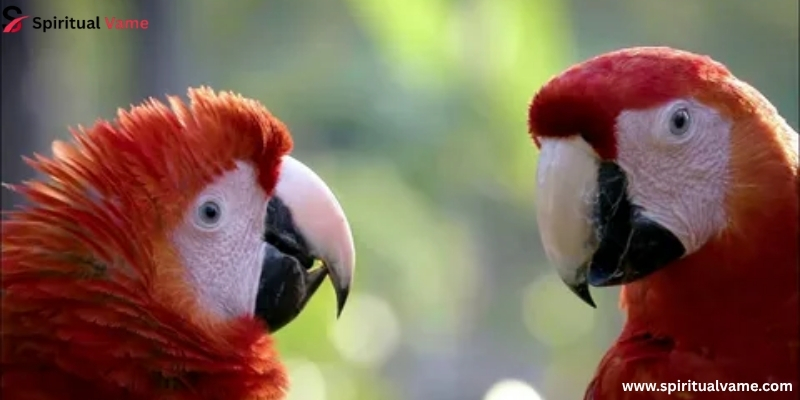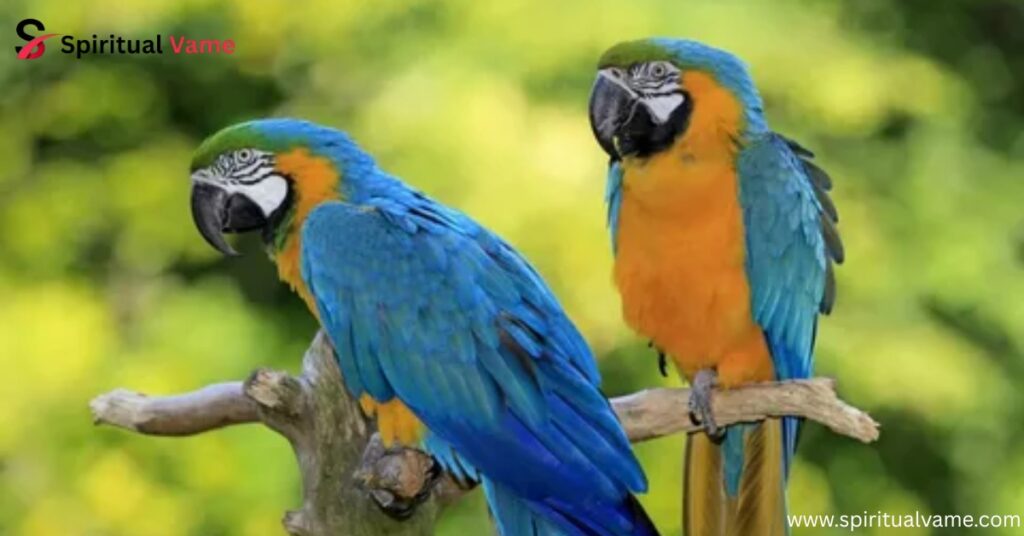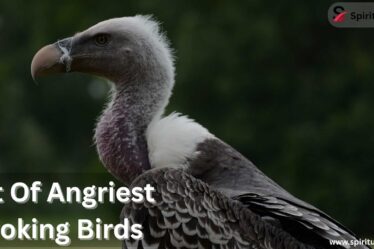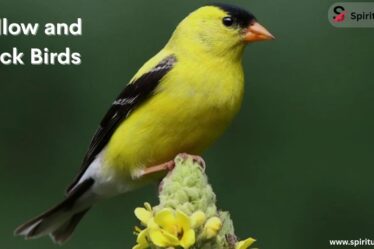
Caring for a macaw takes time, love, and knowledge. These colorful birds need more than just food and a cage. This macaw care guide will help you understand their needs. From diet to toys, each part of their care is important. Macaws are smart and social, so they need attention every day.
In this macaw care guide, you’ll learn how to keep your bird healthy and happy. We’ll cover basic care, feeding tips, and how to create a safe home. Whether you’re new to bird care or have experience, this guide will help. Use this macaw care guide as your go-to resource for raising a strong, joyful macaw.
Caring For Your Pet Macaw
Macaws are more than just beautiful birds with vibrant plumage—they’re smart, emotional, and incredibly social creatures. Owning one is a long-term commitment. These parrots can live for 20 to 50 years, and they need lots of attention, stimulation, and room to thrive. If you’re thinking about bringing one home, know that you’re not just buying a pet—you’re gaining a lifelong companion. They need interaction every single day, and without it, their behavior may change in negative ways.
Caring for a macaw is not something to take lightly. These intelligent birds need a special environment where they feel safe, loved, and mentally engaged. Because of their long lifespan, you should be ready for decades of proper care, daily interaction, and a home that’s suited to meet their needs. They form deep bonds with their humans, and without that strong connection, they can suffer emotionally.
Rare Animals
In the United States, macaws are classified as rare animals, which means owning one might come with legal responsibilities. Some states or cities require permits or have restrictions about keeping large parrots at home. It’s important to check your local laws before you adopt a macaw to avoid any trouble.
Because macaws are rare, they need more than just the basics. You have to consider their natural behaviors, diet, and social needs. These birds are used to flying through rainforests and interacting with their flock. Replacing that with a small cage and no enrichment can lead to stress, loneliness, and serious behavioral problems.
Basic Husbandry
Basic husbandry for a macaw means maintaining a clean, safe, and stimulating environment. You should clean their cage, perches, and food and water bowls every day. A weekly deep clean helps prevent illness and keeps your bird happy. Hygiene plays a big part in keeping these birds healthy, as dirty spaces can lead to infections or even life-threatening diseases.
Handling feathers, waste, and old food needs to be done carefully. Wash your hands before and after touching your macaw or cleaning its area. Make sure they’re in a warm spot with no drafts, and try to keep their living space bright and engaging, just like their natural environment.

General Information
Macaws are one of the largest species in the parrot family. Known for their bold personalities, sharp intelligence, and colorful feathers, these birds are unforgettable. They need lots of space to move and interaction to stay mentally sharp. They love to be part of the family and will even mimic your speech if they’re socialized well.
You can find different species of macaws, each with unique features and temperaments. Some are more vocal, others more affectionate. But one thing they all share is the need for human companionship and daily mental stimulation.
Vital Statistics
Macaws can weigh between 2.5 to 3 pounds depending on their species, and they usually have a wingspan of up to 3.5 feet. These birds are big and need a lot of room to move. They reach sexual maturity around 6 years old and can live up to 50 years or more with proper care.
Their size and strength mean they need strong housing and toys they can chew. Their beaks are powerful, so everything you provide must be safe, durable, and bird-proof. Don’t underestimate how much space and planning they require.
Species Specifics
There are many different macaw species, but the most common in the U.S. include the Blue and Gold, Green-winged, and Scarlet macaws. Each has its own behavior patterns, vocal levels, and dietary preferences. Blue and Gold macaws are very friendly and love attention. Green-winged macaws are calm but need plenty of social interaction.
Some species are more prone to health issues or behavioral problems, so it’s important to learn about the specific macaw species you choose. This helps you create a care routine that matches their unique needs.
Handling and Grooming
Macaws need regular grooming to stay clean and healthy. You should give them access to bathing or misting several times a week. Some birds love bathing in a shallow dish, while others prefer being sprayed with water. This keeps their feathers in good shape and prevents skin issues.
Nails and beaks also need attention. If you notice your macaw’s nails are overgrown, it’s time for a trim. Beaks should look smooth and even. If they’re cracked or growing unevenly, that might mean there’s a health issue. Regular vet check-ups help catch any problems early.
Reproductive Information
Even if you don’t plan to breed your macaw, it’s good to understand their reproductive behavior. Around the age of 6, many macaws reach sexual maturity. During breeding season, both males and females can become more aggressive or territorial. Females may start nesting behavior and even lay eggs, with or without a male present.
If your macaw does lay eggs, make sure you know how to support her. Improper diet and lack of calcium can lead to egg binding, which is an emergency. Reproductive behaviors can also be managed by adjusting light cycles and reducing hormonal triggers.
Housing
Macaws need large, spacious cages—we’re talking at least 36x28x68 inches. The bars should be strong and spaced about an inch apart. A small cage can cause stress, physical damage, and even behavioral issues. Always choose durable, natural materials that can handle a powerful beak.
Place their cage in a part of your household where they’ll get lots of interaction but aren’t exposed to constant drafts or direct sun. Add toys, perches, and items that offer stimulation. Remember, these birds are used to flying for miles. A big cage is still small to them, so they need time outside of it daily.
Diet
A macaw’s diet should be full of variety. Their meals must include pellets, fruits, vegetables, nuts, and seeds. Fresh water should always be available. A balanced and fresh diet supports their health, feather quality, and energy levels. Avoid giving them foods like chocolate, avocado, caffeine, or salty snacks—they can be toxic.
Macaws eat a lot—about 15 to 20 percent of their body weight daily. Rotate different fruits and veggies to keep things interesting. You can add supplementation if recommended by your vet, especially during molting or breeding seasons.
Enrichment
Macaws are highly intelligent and love solving problems. Without daily enrichment, they can become bored or aggressive. Provide toys, puzzles, and hands-on activities. Rotate their enrichment regularly to keep their brains working. Bored birds are often destructive birds.
They also crave social time. Spend time training them, talking, or even watching TV together. These moments build trust and improve your bond. Emotional stimulation is just as important as physical exercise for a macaw’s well-being.

Common Medical Conditions
Macaws are tough birds, but they’re still prone to a few health issues. These include feather plucking, upper respiratory infections, and digestive troubles. You may also notice behavioral signs like lethargy or appetite loss when something’s wrong. If caught early, most of these problems can be treated.
Regular monitoring is the key. Watch for changes in poop, breathing, or eating habits. And don’t ignore new sounds—excessive squawking or sudden silence can be signs of illness too.
Conditions Requiring Veterinary Attention
If your macaw acts differently or seems sick, it’s best to consult a vet. Birds hide their symptoms, so by the time they look sick, they’re often very ill. Look out for droopy wings, tail bobbing when breathing, or changes in droppings. These all signal an urgent health issue.
Macaws need specialized avian care, so always find a vet experienced with parrots. Don’t wait until it’s too late. It’s better to overreact than to miss the signs.
Blue and Gold Macaw – Profile & Care Guide
The Blue and Gold Macaw is one of the most recognized and beloved parrot species in the world. Known for their vibrant plumage, these birds are not just stunning—they’re also highly intelligent, deeply social, and full of personality. Their rich blue wings, golden chest, and green-tinged heads make them unforgettable companions. These macaws can live for 50 years or more with proper care, making them a true lifelong commitment.
They thrive in environments where they receive constant attention, regular interaction, and lots of stimulation. If left alone too long, they may become destructive or show signs of emotional stress. Behavioral issues, such as feather plucking or loud screeching, are usually signs of boredom or lack of engagement. A Blue and Gold Macaw needs not just food and shelter, but emotional connection and daily enrichment to thrive.
Natural Habitat
In the wild, Blue and Gold Macaws are native to the tropical rainforests of South America. They inhabit regions like Brazil, Venezuela, and Colombia, where they live in pairs or flocks, flying across vast canopies in search of food. This natural behavior is key to understanding their needs in captivity.
To mimic this natural habitat, pet owners must provide a large space, a variety of natural perches, and regular flight opportunities outside the cage. Good lighting, humidity, and mental challenges help these macaws feel comfortable and more at home. Their instincts for climbing, chewing, and socializing are strong, so their environment must match that wild energy.
Intelligence And Personality
Few birds rival the intelligence of a Blue and Gold Macaw. These parrots are quick learners and can solve puzzles, mimic voices, and even develop emotional bonds with humans. Their personalities are bold, curious, and expressive. Each bird has its own way of communicating needs, whether through sound, body language, or behavior.
With proper socialization, a macaw can become a delightful companion. But that same brainpower means they need a lot of mental stimulation. Without enough interaction or challenges, they may develop bad habits or become withdrawn. These birds don’t just want a perch—they want a partner.

Talking Ability
Blue and Gold Macaws aren’t just pretty—they’re chatterboxes too. They can mimic human speech clearly and often enjoy learning new words. Some even create unique sounds or phrases that match their daily routines. However, every bird is different. Some may speak more than others, while some prefer whistles or other vocalizations.
Training takes patience and consistency. Positive reinforcement, like treats or affection, helps them learn faster. Always use a calm voice, and never yell—loud or harsh tones can cause stress or confusion. With time and bonding, your macaw may surprise you with its growing vocabulary.
Feeding And Supplements
Feeding a Blue and Gold Macaw is more than just filling a bowl. Their diet must include pellets as the base, mixed with fresh fruits, vegetables, nuts, and occasional seeds. Avoid processed human food and anything with salt, sugar, or caffeine. Some toxic foods include chocolate, avocado, and alcohol—never offer these.
Variety is key to balanced nutrition. Rotate different fruits and vegetables weekly and consider supplements like calcium or vitamin A when needed. Clean, fresh water must be available at all times, and food bowls should be washed daily to prevent bacteria build-up.
Macaw – Large Food
Macaws need large-sized food that encourages chewing and foraging. Offer large chunks of apples, carrots, leafy greens, and bird-safe nuts in shells. This helps with mental stimulation and prevents boredom during meals.
Feeding time can also be enrichment time. Hide treats inside toys or create food puzzles to challenge your bird’s brain. The goal is to keep both their body and mind healthy.
Housing For Your Macaw
Housing a Blue and Gold Macaw means thinking big. These birds need a spacious, well-constructed cage—minimum 36” wide, 28” deep, and 68” tall—with strong bars to prevent escape or chewing damage. Include natural perches, durable toys, and areas for climbing and hanging.
Place the cage in a quiet, but social area of your home. Avoid kitchens (due to fumes) or drafty spots. Natural light and daily out-of-cage time are essential for your macaw’s well-being. Think of their cage as a bedroom, not a prison—they need time and space outside of it every day.
Feather Plucking
Feather plucking is a serious condition often linked to stress, boredom, poor diet, or medical issues. If your macaw starts pulling out feathers, don’t ignore it. First, visit a vet to rule out health problems. Then, examine the bird’s routine: Is it getting enough attention? Are there enough toys and enrichment activities?
Providing proper mental stimulation, a balanced diet, and regular bonding time can reduce feather plucking. Birds are emotional creatures—they pluck when something feels off in their world.
These beautiful birds can become part of your family for generations. With proper care, attention, and love, your Blue and Gold Macaw will reward you with joy, companionship, and a whole lot of personality.
Conclusion
Owning a macaw—especially a Blue and Gold Macaw—is not just about having a pet; it’s about building a lasting relationship with an intelligent, social creature. They require daily interaction, a stimulating environment, a balanced diet, and proper housing to thrive. These birds are not decorations—they’re companions who need time, love, and commitment.



